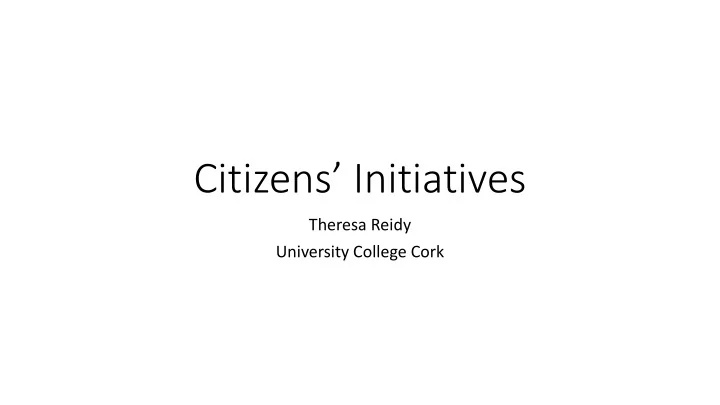

Citizens’ Initiatives Theresa Reidy University College Cork
• Types of initiatives • International experience • Topic limitations, validity rules, technical requirements • Key debates • Irish experience
What are we talking about? • Citizen initiative – citizens propose and vote on new legislation/constitutional change • Agenda initiative – citizens propose new legislation for consideration by parliament • Abrogative referendum – citizens use a popular vote to make a decision on an existing piece of legislation (repeal) • Rejective referendum – citizens use a popular vote to make a decision on a new piece of legislation
International Experience Switzerland, USA, Canada, EU
Switzerland • Veto of legislation • Right of proposal (constitutional issues) • Tax policy • Social policy • Political rights (immigrant and asylum policy) • Infrastructure • Voting takes place 3-4 times a year • Postal voting • Variable turnout
USA • State level (24, most common in western states) • Citizens’ initiatives (direct and indirect) • Dates from early 20 th century • Renewed use from late 1970s • All kinds of issues…
Source: League of Women Voters
Citizens’ Agenda Abrogative Rejective Initiative Initiative Referendum Referendum Lithuania Austria Italy Liechtenstein Hungary Spain Latvia Poland Italy Finland New Zealand EU Germany (Länder)
European Citizens’ Initiative • Introduced by the Lisbon Treaty • One million citizens from 25% of member states can request the Commission to initiate a policy proposal • Initial enthusiasm but just four topics have reached the threshold
Limitations on Subject Matter Valid Votes Procedural Rules
Limitations on the subject matter • IDEA (2008: 66) identifies three groups: • Restrictions on constitutional amendments • Issues concerning the integrity of the state • Limitations relating to legislation and other political decisions
Validity Rules • Binding or consultative? • Turnout thresholds • Double majorities • Super majorities
Procedural Rules • Number of signatures to get legislation on the ballot • Length of time initiative can be in circulation • Signature verification • Naming and summary of the initiative
Signature Rules (Source: Qvortrup, 2013: 62) Country Population (millions) Signatures Required AUSTRIA 8.1 100,000 FRANCE 59.6 4,100,000 HUNGARY 10.2 50,000 ITALY 57.6 50,000 LATVIA 2.3 230,000 LITHUANIA 3.5 50,000 NETHERLANDS 16.3 40,000 POLAND 38.6 100,000 ROMANIA 22.3 250,000 SLOVAKIA 5.3 350,000 SLOVENIA 1.9 5,000 SPAIN 39.4 500,000
Procedural Rules • Number of signatures to get legislation on the ballot • Length of time initiative can be in circulation • Signature verification • Naming and summary of the initiative • Competing measures
Citizens’ Initiatives: debates and controversies
Key Debates • Impact on politics • Tyranny of the majority • Big money • Quality of legislation • Voter interest and attention
Irish Experience • 1922 Constitution • Whitaker Report • Constitutional Convention
Extract from the 4th Report of the Constitutional Convention (results of voting) Should ‘direct democracy’ (i.e. citizens’ initiatives) with adequate safeguards be introduced? Yes No No opinion 83 16 1
In the event that the Constitutional Convention votes in favour of direct democracy, which of the following should it apply to: Yes No No opinion Placing items on, or removing them from, the legislative agenda 80 19 1 Requiring constitutional referendums to be held 78 17 4
Conclusion Initiatives are an attractive proposition. They give voters a great deal of influence to set the agenda. They provide opportunities for voters to engage with politics more regularly and effectively. However In practice, initiative instruments are very complex, require careful consideration and design. And often, they fail to deliver on the promises of democratic empowerment and engagement.
Recommend
More recommend